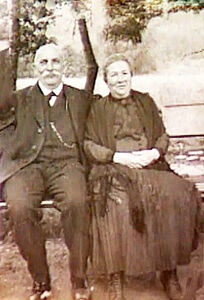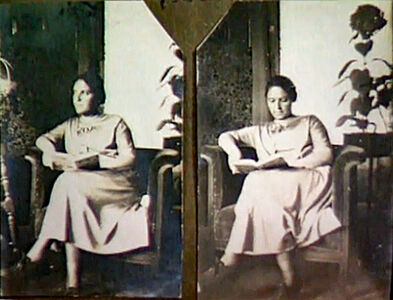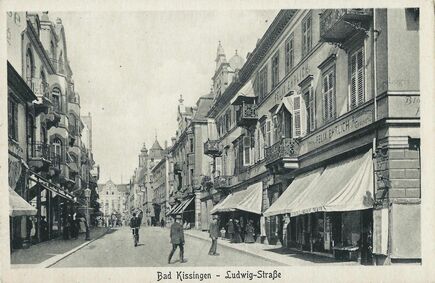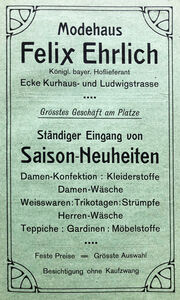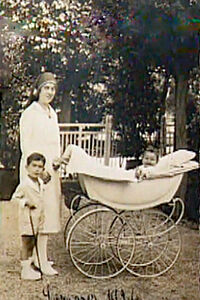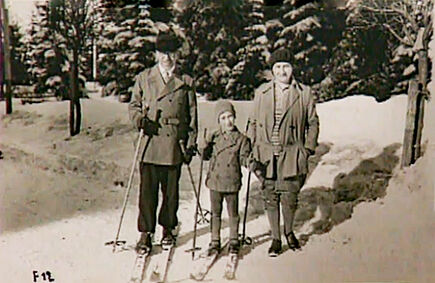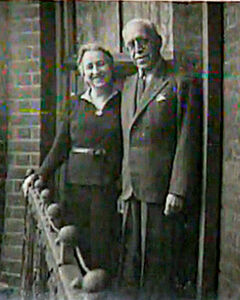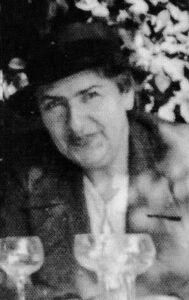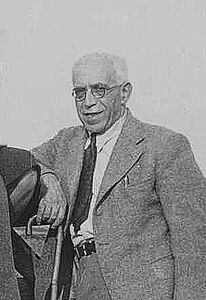personal data
Ehrlich Adele
Parents: Max and Bertha Leven née Herz
Spouse: Franz Ehrlich
Children: Felicitas (Liesel), Fritz (Fred)
April 1937 emigrated to London
biography
Adele Ehrlich, née Leven, was born on February 4, 1886, daughter of Max Leven and his wife Bertha, née Herz, in Unna, Westphalia, and grew up with her four siblings Paula (*1881), Otto (*1882), Moritz (*1884) and Lilly (*1890). Her brother Moritz died as a soldier in the First World War.
In 1921 Adele Leven married Franz Ehrlich who was the co-owner of Modehaus (fashion store) Ehrlich in Bad Kissingen and moved into Ludwigstrasse with him. In her young professional years, she was a highly qualified and very well-paid tailor who had learned her profession in France, spoke French fluently and directed a group of seven Haute Couture seamstresses for women’s fashion. (See J. Ereli, p. 29) The private happiness of the family seemed perfect: in 1922 their son Fritz (later Fred) was born and their daughter Felicitas (Liesel) followed him in 1926. Adele concentrated fully on her work in the fashion business and tailoring, while Anna, a Catholic housekeeper, took over the housework and the children's upbringing. Fred Ehrlich, Adele's son, remembers: „We had a housekeeper called Anna. Because my mother worked full-time, and very long hours, and very hard in the shop. The household was run by a wonderful person called Anna [...] She was not Jewish. She was Catholic, very religious, and had lots of time-- as much time off she wanted to go to church every Sunday, every Christmas, and Easter. But she was very, very friendly with us, and she certainly brought my sister up, and brought me up, as much as anybody else. And her cooking was superb" (USC Shoa Foundation, Visual History Archive, Interview mit ![]() Fred Ehrlich)
Fred Ehrlich)![]() .
.
There were no strict Jewish food rules in the Ehrlich household; no one in the house - including the other Ehrlich families - kept kosher. And the synagogue was only attended irregularly, always for the high holidays. But of course the Ehrlichs were members of the Jewish community. They met with their Jewish friends for social gatherings and perhaps once a year organized a theater performance or a fancy costume party on Purim. And on major holidays, the extended family met in Aunt Ida's spacious apartment on the second floor (cf. ibid.).
However, this happy time was soon to come to an end when the National Socialists came to power. Of course, the city's largest fashion store was also immediately affected by the boycott measures, SA men prevented customers from entering the store and revenue declined. However, Fred Ehrlich also remembers customers who knew how to take advantage of the plight of Jewish business people: „The local people knew exactly what was happening. And they came and shopped. Say, a man could come in and buy a linen and tablecloths and bed linen for his daughter who was getting married, but not pay, because he knew perfectly well that a Jewish shopkeeper could, under no circumstances, demand money from a member of the Nazi party. And at the same time, we couldn't afford to refuse to supply him. So they soon got the hang of that“ (ibid.).
In 1935, local Nazis carried out a night-time attack on several Jewish shops. The glass windows of the Ehrlich fashion store were also smeared with acid. The Hebrew characters for "kosher" were engraved on them.
In the fall of 1936 - the situation had become increasingly threatening for the family - Adele's husband was warned by an acquaintance, probably a former comrade-in-arms, that the Nazis were up to something against him and that it would be better if he left the city immediately. Adele and Franz left Bad Kissingen on the night train and traveled by train to Holland and from Holland to England.
Adele returned to Bad Kissingen once in 1937, dissolved their apartment and arranged for their two children to leave the country. Franz stayed in England because the risk of getting arrested in Germany was too high for him. In April 1937, Adele left Bad Kissingen with her children Fred and Liesel to emigrate to England via Holland. She made a stopover in Cologne and took the local train to Unna. There she said goodbye to her 83-year-old father, whom she had to leave behind in a retirement home with a heavy heart. Her mother had already died in 1932. Max Leven was deported from Dortmund to Theresienstadt in July 1942 and from there to Treblinka in September 1942, where he was murdered.
Adele's siblings Paula, Otto and Lilly, on the other hand, were able to escape from Germany and survived the Nazi era.
When they left for England, the family was supported by Uncle Ludi who „had to give a guarantee to the British government that we would not draw unemployment benefit or any other benefit from the British government. Because in Britain at the time was unemployment on a large scale“ (Ibid.). At first they found shelter on Uncle Ludi's country estate in Bexley/Kent and Franz got a job in the City of London with a company that traded in non-ferrous metals, and Adele now took care of the household. Finally they moved to Birmingham. (See J. Ereli, p. 68).
So the family stayed in England after the war, only their daughter Liesel who had joined the Zionist Movement married Herbert Schreiber and emigrated to Israel.
Adele Ehrlich died in Birmingham in December 1976 at the age of 90. Fred Ehrlich characterizes his mother with the following words: "A very gentle person. And a big support for the whole family." (ibid.).
From the photo album:
(Most of the information was provided by the autobiography of her nephew Joske Ereli and the USC Shoa Foundation Interview with Fred Ehrlich.)
References
Joske Ereli, Von Hampi Ehrlich zu Jossl Ereli - Meine Lebensgeschichte
USC Shoa Foundation, Visual History Archive, Interview mit Fred Ehrlich![]()
Hans-Jürgen Beck, Kissingen war unsere Heimat, Stand April 2017, S.581
Datenbank Ancestry, Sterbeindex England & Wales, 1916-2007![]()
Photo credits
© Datenbank Ancestry, Stammbaum Adele Leven![]()
Familienfotos © Fred Ehrlich
Back
